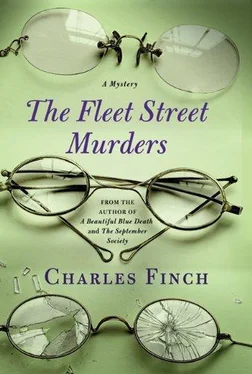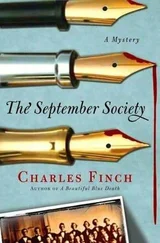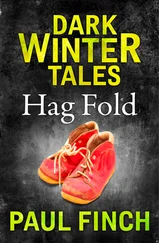Charles Finch - Fleet Street murders
Здесь есть возможность читать онлайн «Charles Finch - Fleet Street murders» весь текст электронной книги совершенно бесплатно (целиком полную версию без сокращений). В некоторых случаях можно слушать аудио, скачать через торрент в формате fb2 и присутствует краткое содержание. Жанр: Исторический детектив, на английском языке. Описание произведения, (предисловие) а так же отзывы посетителей доступны на портале библиотеки ЛибКат.
- Название:Fleet Street murders
- Автор:
- Жанр:
- Год:неизвестен
- ISBN:нет данных
- Рейтинг книги:5 / 5. Голосов: 1
-
Избранное:Добавить в избранное
- Отзывы:
-
Ваша оценка:
- 100
- 1
- 2
- 3
- 4
- 5
Fleet Street murders: краткое содержание, описание и аннотация
Предлагаем к чтению аннотацию, описание, краткое содержание или предисловие (зависит от того, что написал сам автор книги «Fleet Street murders»). Если вы не нашли необходимую информацию о книге — напишите в комментариях, мы постараемся отыскать её.
Fleet Street murders — читать онлайн бесплатно полную книгу (весь текст) целиком
Ниже представлен текст книги, разбитый по страницам. Система сохранения места последней прочитанной страницы, позволяет с удобством читать онлайн бесплатно книгу «Fleet Street murders», без необходимости каждый раз заново искать на чём Вы остановились. Поставьте закладку, и сможете в любой момент перейти на страницу, на которой закончили чтение.
Интервал:
Закладка:
The place was largely deserted. One stooped old man-an oenophile, judging from the excited quiver of his nose over every bottle he smelled-was rooting through a case in the back, but the proprietor didn’t pay him any mind, standing instead at the desk in front of his ledger.
Now, this ledger was famous. It was magnificently large, bound in the same hunter green that the shop was painted, and recorded the preferences and history of every client who visited the shop more than once. As soon as Lenox’s face had appeared in the doorway, the man behind the ledger was riffling through it to find the L section.
“Hullo, Mr. Berry,” said Lenox.
“Mr. Lenox, sir,” said Mr. Berry, with a slight nod of his head. “How may I be of service to you?”
Lenox put his hands in his pockets and frowned, looking around the glass cases that held the sample bottles. “What do I like?” he said.
In general conversation this would be a peculiar question, but Mr. Berry heard it a dozen times a day. “What are you eating?”
“Probably beef.”
“You have two cases of the Cheval Blanc ’62 laid down, sir,” he said.
Lenox frowned again. “Does Graham know?”
Graham knew everything about wine.
“Yes, sir. I believe you purchased it under his advisement.”
“And I like it?”
“Yes, sir,” said Mr. Berry. “You took two bottles of it to a dinner party in March. You said it was”-he consulted the ledger-“tasty, sir.” This word repeated with faint disapproval.
“Well, better give me three bottles.”
“Straightaway, sir.”
This business soon transacted, Lenox and Mr. Berry spent a quarter of an hour discussing Scotch whisky, and before he left Lenox had tasted several samples and was feeling distinctly warm in his belly. He left with a bottle of the darkest sample he had tried, Talisker.
Lenox returned to Lady Jane’s to find her ready and was enjoying a quick sip of the Talisker when there was a knock on the door.
It was Graham. Because Lenox and Lady Jane lived in houses that adjoined, their servants often popped back and forth to deliver messages.
“You have a visitor, sir,” said Graham.
“Damn. Who is it?”
“Inspector Exeter.”
“Oh, yes? Well, Jane, do I have time to see him?”
She looked over at the silver clock that stood on her desk. “Yes, if you like,” she said. “I’ll order my carriage. That should take a quarter of an hour.”
“I’ll be faster than that, I hope.”
Exeter was waiting in Lenox’s study. He was a large, physically imposing man, who-to give him his credit-had evinced time and again tremendous physical bravery. Cowardice was never his flaw. Rather, it was that he was so hidebound and resistant to new ideas. He had a stubborn face, adorned somewhat absurdly with a fat black mustache. He was twisting the ends of this with two fingers when Lenox came in.
Well, thought Lenox, what will it be: a plea for help or a warning to stay out of the case? The two men stood facing each other.
“Mr. Lenox,” said Exeter with a supercilious smile.
Here to crow, then, thought Lenox. “How do you do, Inspector? Good evening.”
“I expect you’ve been following the murders? The Fleet Street murders?”
“I have, certainly, with keen interest. I hope their solution progresses well?”
“In fact it does, Mr. Lenox. In fact it does. We have apprehended the criminal responsible.”
Lenox was shocked. “What? Poole?”
Exeter frowned. “Poole? How did you-never mind-no, it’s a young cockney chap, Hiram Smalls. He’s a short, strong fellow.”
“Oh?” he said. “I’m delighted to hear it. How, pray tell, did he move between the two houses so rapidly? He flew, I take it?”
The smile returned to Exeter’s face. “We expect Smalls to give us his compatriot, after a few solitary days with the prospect of the gallows in mind.”
“Indeed,” said Lenox and nodded. “How did you find him?”
“Eyewitness. Always begin, Mr. Lenox-and I say this with the benefit of many professional years of hindsight-always begin with a canvass of the area. Now, that’s something an amateur might find difficult, comparatively, given the resources in manpower and time of the Yard.”
Damn the man’s insolence, thought Lenox. “Indeed,” was all he said.
“Well, I thought I ought to let you know.”
“I thank you.”
“I know you’ve taken an interest… an amateur interest in several of our cases and even helped us once or twice, but I wanted to tell you that this one is solved. No need for your heroics, sir!”
“I’m very happy for you.”
“Thank you, Mr. Lenox, most gracious. Well-and good day.”
“Good day, Mr. Exeter.”
“Enjoy your party.”
These words he said with as much sarcasm as he could muster, and then he nodded to Lenox and left.
“It’s for the best anyway,” Lenox muttered to himself as he poured a glass of sherry at his side table. It was time to focus on politics, after all.
The dinner party that evening was at the house of Lady Emily Nevin, a rather mysterious Hungarian woman (said to be the daughter of some nobleman in her home country) who had married a romantic young baronet just before his death. She had inherited everything but his title, which had gone to an impoverished country cousin who could make no bread by it and still had to till his own earth. Still, people “went to see her,” as the phrase went-because the Prince of Wales, on whom Lady Nevin exerted all of her many charms, did.
It was Lady Nevin’s great conceit that wherever she went she kept a pet on a leash-a hedgehog. It was called Jezebel and waddled around with a surly look on its face, its well-groomed coat glistening with perfume and pomade. She had found it in the basement of her house; indeed, many people in London kept hedgehogs in their basements-the animals slept a great deal in whatever warm corner they could find and voraciously discovered and ate all of a house’s insects. Few, though, brought them upstairs as Lady Nevin had. She even took the creature to other people’s houses. It was considered either wickedly funny or profoundly tasteless, depending whom you spoke to. Lenox found it primarily silly, although he never entirely discounted the bond between a human and an animal because of a Labrador (Labbie, by name) that he had been given as a child and loved with all his heart.
Despite the hedgehog, Lenox was having no fun at the party. Held in a broad, overheated room with windows overlooking the Thames, it contained few people he knew and fewer of his friends. Lady Jane, with her inexhaustible acquaintance, moved easily among the small groups, but Lenox stood by the window, glumly eating a sherbet. They made a funny sort of couple on occasions like this.
Just then Lenox heard a voice behind him, and every nerve in his body went taut.
“An orchid, for the lady of the house,” it said, in a tone that had once sounded arrogant to his ears but now sounded sinister as well.
“Why, thank you, Mr. Barnard,” said Lady Nevin graciously. “How kind you are to a poor widow.”
Lenox half-turned, if only to confirm that it was indeed George Barnard.
He was a powerful man, aged fifty or so, who had served time in Parliament and just finished a successful stint as Master of Great Britain’s Royal Mint. He had retired into private life with an eye toward the House of Lords; judicious donations to the correct charities (and he was opulently rich, if nothing else) were, society assured him, enough to earn a title to match his wealth. He was a self-made man who had grown up somewhere in the north of England, which London associated, to the region’s detriment, with factories and soot, but he had shaken off that dubious birth to rise to his current heights. He was well liked now and known for the beautiful orchids he grew himself and always brought to parties-or, if there wasn’t one at its peak, a bowl of the oranges and lemons he grew in his green house.
Читать дальшеИнтервал:
Закладка:
Похожие книги на «Fleet Street murders»
Представляем Вашему вниманию похожие книги на «Fleet Street murders» списком для выбора. Мы отобрали схожую по названию и смыслу литературу в надежде предоставить читателям больше вариантов отыскать новые, интересные, ещё непрочитанные произведения.
Обсуждение, отзывы о книге «Fleet Street murders» и просто собственные мнения читателей. Оставьте ваши комментарии, напишите, что Вы думаете о произведении, его смысле или главных героях. Укажите что конкретно понравилось, а что нет, и почему Вы так считаете.












